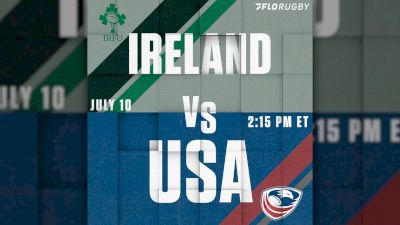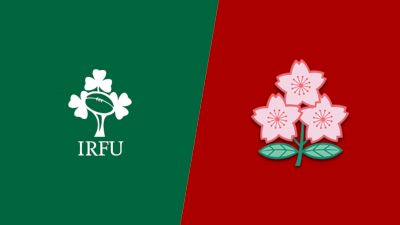7 Things You Didn't Know About Ireland Rugby
7 Things You Didn't Know About Ireland Rugby
A week after going toe to toe with England at Twickenham, the Eagles now head to the Emerald Isle, where they’ll take on Ireland at Lansdowne Road.

A week after going toe to toe with England at Twickenham, the Eagles now head to the Emerald Isle, where they’ll take on Ireland at Lansdowne Road. The matchup will mark the second time our young American squad will be taking on a titan of World Rugby in a six-day span, but more importantly will be a true measuring stick for how far we’ve come as a true rugby nation.
Are we there yet?
We won’t truly know until the dust has settled on this wacky year and we’re playing consistent test matches, but for now the focus is on Ireland. Speaking of whom, what do we know about the men in green, who currently sit fourth in the World Rugby Rankings? Let’s find out:
Where it all started: Dublin
Way back when, 1854 to be exact, a group of students at Dublin University, who’d learned rugby at school in Britain, introduced the wonderful sport to their schoolmates and thus created the original rugby club in Ireland: Dublin University Rugby Club. Through the years, the game grew in popularity until by 1875 there were eight established clubs across the country: NIFC (1868); Wanderers (1869); Queen's University (1869); Lansdowne (1873); Dungannon (1873); Co. Carlow (1873); UCC (1874); and Ballinasloe (1875). In 1879, the IRFU was formed, and to this day stands as the official governing body of Irish Rugby - how’s that for longevity?
A middle-class Protestant sport?
Until the 20th century, rugby in Ireland was a sport dominated by Protestants from the middle class. The great Ireland team of 1894 which really got the team on the map consisted of just one Catholic man, the legendary Thomas Crean. Naturally, as time went on rugby became a sport enjoyed by Irishmen from most all walks of life, but in the early days you didn’t see a whole lot of Catholic representation.
What's the Irish Grand Slams?
The ultimate yearly goal for tier-1 nations in the Northern Hemisphere is to achieve the illustrious “Grand Slam” - sweeping the annual Five Nations (now Six Nations) competition. Though the tournament was founded in 1883, Ireland didn’t pull off its first Slam until 1948, and since then they’ve completed the feat just two more times. Once in 2009, with Ronan O’Gara’s 78th min drop goal sealing the deal in the final round against Wales, and again in 2018, when Johnny Sexton & co. took England to the cleaners on Saint Patrick’s Day to seal their third Grand Slam. Despite all of Ireland’s historical success, they’ve found Grand Slams rather elusive.
Never won a knockout game?
It’s almost hard to believe, but the Irish have failed to ever win a World Cup knockout stage game. In nine tournaments, the Irish have yet to advance to a semi-final, losing time and time again in the quarters. Their closest effort came in 1991, when they almost pulled off one of the great upsets in World Cup history, taking eventual champions Australia to the final whistle, only to see Wallaby Michael Lynagh cross over on the final play of the game to lift the Aussies to a 19-18 win. This has seemingly cursed the Irish, who have since failed to come any closer than 12 points in a knockout fixture on rugby’s biggest stage.
Two World Rugby Player of the Year Winners
Since the advent of the World Rugby Player of the Year award in 2001, Ireland has been responsible for two winners of the honor. The first came in 2001, when hooker Keith Wood was recognized as the best rugby player on the planet; the do-it-all front rower in fact held the record for most test match tries by a front rower until in 2018 the United States’ own Joe Taufeteʻe overtook the Ireland great. The second Irish winner of the award was flyhalf Johnny Sexton in 2018, after the talismanic leader willed his team to a Grand Slam, a three-game series victory in Australia, and a major upset of the All Blacks. Sexton will always be remembered for his exceptional service to the green shirt over the years, but 2018 was possibly his greatest stroke.
History in Chi-Town
It might have taken well over a century, but on November 5th, 2016 Ireland recorded its first ever victory over New Zealand, toppling the All Blacks by a score of 40-29 at Soldier Field in Chicago. Not only was the loss significant in that it ended Ireland’s century-plus long drought against the Kiwis, it also ended New Zealand’s 18-game win streak, which is tied for the longest ever. In front of a sold out crowd, Ireland stunned the reigning world champions with a largely dominant performance that put the rugby universe on pause, and reminded us all that the All Blacks are indeed human beings made of the same flesh and bones as the rest of us.
The Irish love taking on the Americans
Sadly, Ireland’s biggest win of all time came against our Eagles in 2000, when the Americans shipped more than 80 points in an 83-3 defeat in New Hampshire; in nine other attempts, the Eagles are also yet to notch a victory. Though the U.S. has come as close as a 15-12 loss in 2013, many of the matches have been lopsided scores. Saturday’s outing should prove to be far more competitive than the Eagles’ last few trips to Ireland, particularly if the Americnas can channel their second half performance from last Sunday at Twickenham.
Watch a replay of Ireland taking on Japan:
